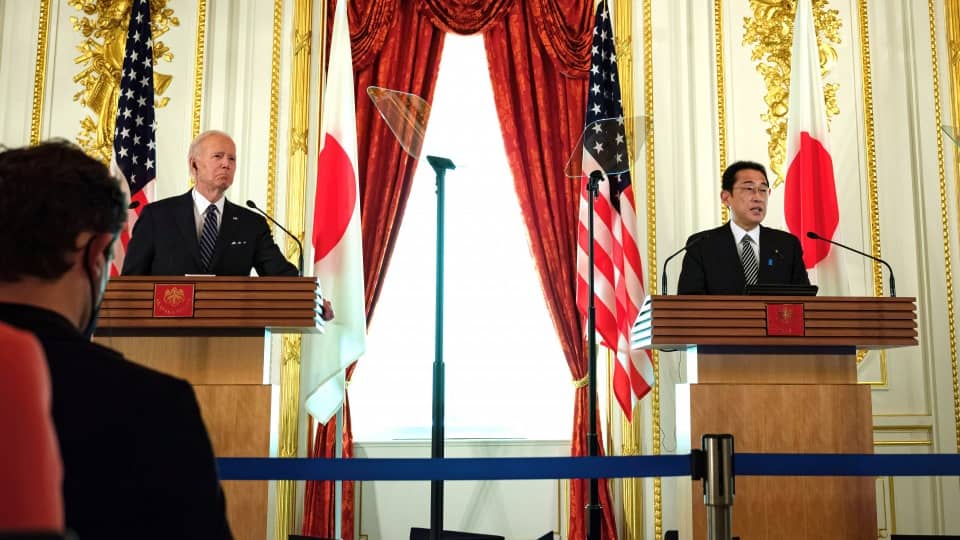Japan, U.S. to deepen semiconductor alliance amid supply crunch

Collected Image
Japanese Prime Minister Fumio Kishida and U.S. President Joe Biden agreed Monday to deepen cooperation in semiconductor research and development to expand their nations' production capacity and secure a stable supply of strategically important chips amid global shortages. "We were able to reach an agreement on economic security cooperation, including the development of cutting-edge semiconductors," Kishida told a press conference after the meeting.
Kishida said both sides confirmed they would coordinate further and hold a ministerial-level meeting of the Japan-U.S. Economic Policy Consultative Committee in July. With the world facing a supply crunch amid the COVID-19 pandemic that has been exacerbated by Russia's invasion of Ukraine, a stable supply of chips during disruptions, such as conflicts and natural disasters, has become a matter of urgency. The two allies aim to make ground on the leading nations in semiconductor production, such as Taiwan and South Korea, according to officials. Kishida had pledged to intensify discussions on semiconductor-related issues with the United States, saying Japan once held about a 50 percent share of the global semiconductor market but lost its dominance due to policy "failures."
In early May, Economy, Trade and Industry Minister Koichi Hagiuda and U.S. Secretary of Commerce Gina Raimondo released what they dubbed basic principles of semiconductor cooperation, after their meeting in which they highlighted the importance of strengthening and diversifying semiconductor production capacity, in addition to coordinating emergency responses.
At the same time, Japan is working to establish domestic talent development programs involving industry, academia and government sectors to boost the development of semiconductors and batteries.
The government has also established a subsidy program to support the construction of new manufacturing facilities, with Taiwan Semiconductor Manufacturing Co's new plant in Kumamoto Prefecture expected to be the first recipient of the subsidy.
Kishida said both sides confirmed they would coordinate further and hold a ministerial-level meeting of the Japan-U.S. Economic Policy Consultative Committee in July. With the world facing a supply crunch amid the COVID-19 pandemic that has been exacerbated by Russia's invasion of Ukraine, a stable supply of chips during disruptions, such as conflicts and natural disasters, has become a matter of urgency. The two allies aim to make ground on the leading nations in semiconductor production, such as Taiwan and South Korea, according to officials. Kishida had pledged to intensify discussions on semiconductor-related issues with the United States, saying Japan once held about a 50 percent share of the global semiconductor market but lost its dominance due to policy "failures."
In early May, Economy, Trade and Industry Minister Koichi Hagiuda and U.S. Secretary of Commerce Gina Raimondo released what they dubbed basic principles of semiconductor cooperation, after their meeting in which they highlighted the importance of strengthening and diversifying semiconductor production capacity, in addition to coordinating emergency responses.
At the same time, Japan is working to establish domestic talent development programs involving industry, academia and government sectors to boost the development of semiconductors and batteries.
The government has also established a subsidy program to support the construction of new manufacturing facilities, with Taiwan Semiconductor Manufacturing Co's new plant in Kumamoto Prefecture expected to be the first recipient of the subsidy.
Source: https://japantoday.com
Tags :
Previous Story
- Japan records trade deficit as imports surge on...
- Foot Operated computer Mouse Wheel Launches in Japan...
- Body-monitoring tech trend comes with concerns
- Kishida calls for aggressive wage hikes in push...
- Japan starts year's 1st day of work amid...
- What are the best ways to invest your...
- Record number of Japanese startups to be at...
- Asia looks to China-focused RCEP trade bloc as...